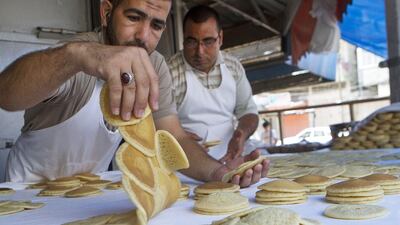GAZA CITY // The banks are closed, restaurants shuttered and schools empty. Yet, Essam Al Nimer says nothing can stop him from cooking up Ramadan’s most sought-after pastry for the people of Gaza.
While most shops in the territory are closed because of Israel’s relentless bombardment, Mr Al Nimer’s small bakery continues to churn out the delicious, tiny pancakes, called qatayef, that are consumed in vast quantities after a day’s fast during the holy month.
“Stop working! Impossible!” shouts Mr Nimer, 30, who wears a batter-smeared apron and a small radio headset to listen to news of fighting between Israel and Gaza’s Hamas militants.
Every day from 6am to 8pm, he and four family members who work at the Abu Ramadan for Sweets bakery in Gaza City toil in the summer heat to prepare dozens of kilograms of walnuts, almonds, cinnamon and powdered sugar.
Those ingredients are ground up and mixed together to form a blend called hashweh that is folded inside a pancake and dipped into boiling syrup. The end result is a viscous pastry that is specially made for Ramadan and is readily devoured across the Levant and other parts of the Arab world.
“It’s not Ramadan without it!” says Umm Akram, 55, a grandmother of 12 who was one of a handful of people hauling bags of fruit and vegetables in Gaza City’s otherwise empty streets. She was planning to buy qatayef at Abu Ramadan’s, which she called “the best!”
This year, what should be a time of indulging in the mouthwatering delights of qatayef has instead been overshadowed by the destruction of entire families and their homes by punishing rounds of Israeli air strikes.
The death toll of nearly 200 Palestinians has surpassed that of the eight-day war between Hamas and Israel in 2012, stoking fear and panic among this tiny, densely packed and impoverished territory of 1.8 million people. One Israeli has been killed in the violence.
One of the targets was a home just down the street from Abu Ramadan for Sweets. An Israeli drone had fired a missile at the house. Then it was flattened by two air strikes, Mr Al Nimer says.
No one was killed in that attack, which took place on Thursday, he says. But a day later, a strike just down the street in the other direction killed seven people.
As Mr Al Nimer stands flippping pancakes, with customers barking orders for this or that amount of Qatayef, a militant-fired rocket whooshes overhead on its way to Israel. “Ma salaama,” he says, waving goodbye to the departing projectile, one of more than 1,000 that Israel says has been fired at it.
Rather than surrendering to panic, he explains that keeping Abu Ramadan for Sweets open during the war is not just for the business, which appears to be doing well despite the conditions, but also a duty.
“We have to support the Palestinian people. Yes, qatayef is part of our culture and heritage, but the people during this war need all the sugar and energy they can get. So we’re serving it to them.”
And serve them he has. His “grandfather’s grandfathers” have prepared and sold qatayef for generations. Previously, the family ran bakeries in two other areas of Gaza, but opened Abu Ramadan for Sweets in its current location because it is close to their homes.
Venturing out to find what they can in terms of essentials such as water, fruits, vegetable and rice, residents of Gaza City also stop by Mr Al Nimer’s bakery to buy qatayef at Dh9 a kilogram.
This is not an insignificant sum for Gazans. But Abu Al Abed, 66, says Ramadan iftars would not be the same without the treat. In his opinion, the best qatayef comes from Abu Ramadan for Sweets.
“It has to be soft but not soggy and it has to have the right mix of nuts, and it can’t be too sweet,” says Mr Al Abed, who is retired and lives down the street from the bakery.
“That’s why I come here.”
The mastermind of the bakery’s qatayef is the man who founded the family’s current establishment and named it after himself. Abu Ramadan, a taciturn 45-year-old who is Mr Al Nimer’s cousin, says he spent years perfecting the pastry. It is a serious endeavour, and he declines to reveal details of his secret recipe.
“When I was young and learning how to do this, my boss would hit my hands with an iron ball,” he says seriously.
Mr Al Nimer interrupts his uncle with a nervous smile: “We don’t do that now.”
Whatever the secrets to good baking, the customers still line up here despite the thuds of explosions in the background. Some smile. Others wish each other a Ramadan Kareem.
But all of them appear to walk away satisfied with Abu Ramadan for Sweets’ tasty qatayef. However, there is one catch, says Mr Al Nimer.
“Our qatayef would taste a lot better if there was peace.”
hnaylor@thenational.ae

